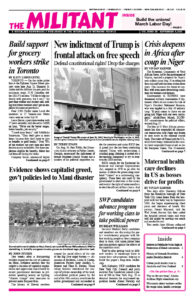Two days after Shamony Gibson from the Brooklyn borough of New York City came home from the hospital with her baby boy in September 2019, she began experiencing chest pains and shortness of breath. Her partner, Omari Maynard, told the Wall Street Journal that they called the hospital several times and were told she might be moving too much and needed to rest.
Two weeks later Gibson collapsed and went into cardiac arrest, dying the next day from a blood clot in her lung, a treatable condition if caught early.
As the bosses drive to push their deepening economic crisis onto our backs, health care for working people has been one of their targets — making it harder to come by and more expensive. As medical workers in understaffed hospitals are pushed to the limit, deaths from inadequate, or lack of, medical attention are becoming more common.
The number of mothers who died within a year of pregnancy doubled from 1999 to 2019, even as the birthrate dropped. In 2021, more than 1,200 women died while pregnant or shortly after giving birth, the highest number since 1965.
Maternal deaths are higher in the U.S. than any other developed capitalist country. Despite African Americans being only 14% of the overall population, 30% of maternal deaths are among Black women.
These deaths, overwhelmingly preventable, contributed to the drop in life expectancy in the U.S. to 76 years, the lowest in more than a quarter of a century.
Over the last five years, administrators of 300 hospitals, many of them in rural areas, have closed down maternity wards in order to cut costs. According to an Aug. 1 report by the March of Dimes, more than 5.6 million women in the U.S. live in counties with limited or no access to maternity care. This is highest in the Midwestern and Southern states.
“A person’s ability to have a healthy pregnancy and healthy birth should not be dictated by where they live and their ability to access consistent, quality care,” March of Dimes President Elizabeth Cherot said in the report. “Maternity care is simply not a priority in our healthcare system.”
These appalling figures didn’t just happen. Decisions to ruthlessly put profits above all else, combined with the bosses’ callous indifference to the life and limbs of workers and our families, made them inevitable. Under capitalism, medicine is a for-profit business, not a social necessity.
After some special federal pandemic programs ran out in April, Democratic and Republican state officials began the process of kicking up to 15 million people — lower-income individuals and families — off Medicaid or the Children’s Health Insurance Program. Medicaid pays for 41% of births and is the largest insurer for children.
More than a million people, including many children, have already lost coverage, despite still being eligible, merely because they never received a letter or missed a call about policy changes.
In May, Liz Adams in Tallahassee, Florida, was informed that her two kids were no longer covered. The news came a day before her 7-year-old son Bryan was scheduled for needed leukemia care. “I am mad. I am mad at how they can do this to a child,” she told ABC News.
Working-class families bear the brunt of these attacks, which go hand in hand with longer work hours; increasing workloads and more dangerous working and living conditions; skyrocketing costs for child care; and more. Steady employment at wages sufficient for young people to begin or sustain a family are less and less available. Family breakdowns, once seen as an “African American affliction,” are now more widespread among all working people.
It’s contract battles and broader social struggles led by the union movement that can begin to prevent this carnage. Millions of workers need wage increases to cover the rising costs of food and housing, as well as work schedules and conditions that make family time possible. This is crucial for social activity together, to care for children who are sick, and to read and take part in union, political and cultural activity.
Thousands of workers through their unions — from hotel workers on strike in Los Angeles to International Flavors and Fragrances workers in Memphis, Tennessee, and nurses in New Jersey — have begun fighting around some of these issues.
“These union fighters, and others like them, deserve our support,” Sara Lobman, Socialist Workers Party candidate for New York City Council, told the Militant. “Out of these battles, our unions can grow stronger and take the leadership needed to advance the interests of all those exploited and oppressed by capital.”

